The Allure of Fragrance: A Journey Through Ancient Roman Society
Perfume and scent were important in ancient Roman society, not just as nice things to have but as signs of power, luxury, and social status. The Romans brought in exotic spices and essences from faraway places like India and Arabia to create special fragrances that reflected the greatness of their civilization. Perfumes were everywhere in Rome, from personal grooming to public areas, creating early forms of scented environments that filled everyday life.
The word “perfume” comes from the Latin term “per fumum,” which means “through smoke.” This shows the link between smells and the burning of fragrant materials like resins. These scents weren’t only for individual enjoyment; they had significant roles in important occasions and ceremonies, acting as social and political symbols of refinement and kindness.
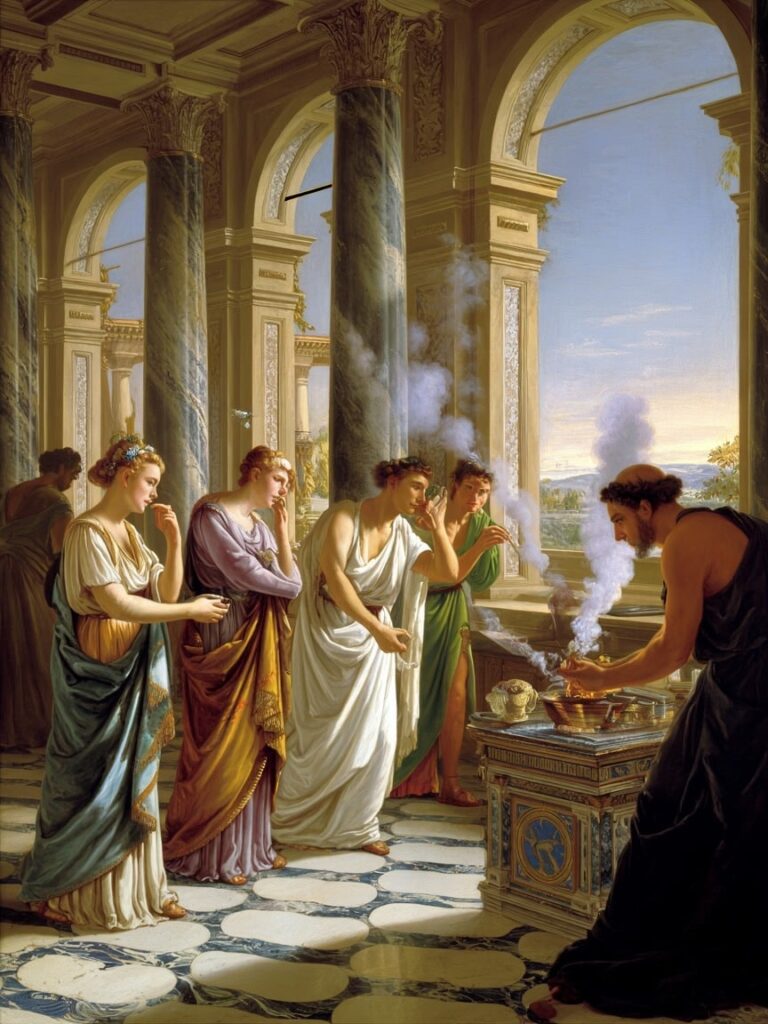
The Luxurious Essence of Power: Perfume as a Status Symbol
In ancient Rome, perfume was more than just something to smell good; it represented power, luxury, and social status. Here’s how the Romans saw perfumes as more than just nice scents:
1. Imports of Exotic Spices
Roman elites spent a lot of money bringing in rare spices and essences from distant places like India and Arabia. These valuable ingredients were skillfully mixed to create one-of-a-kind fragrances that made them stand out.
2. Symbolism of Power and Luxury
Perfume wasn’t just something to make you look good; it was a sign of wealth and influence. Those who could afford expensive perfumes showed off their social status with beautiful scents that followed them everywhere.
These exclusive fragrances were not only pleasing to the senses but also conveyed messages about one’s position in Roman society—indicating wealth, refinement, and sophistication. The art of making perfumes was a skill reserved for the upper class, shaping opinions and leaving a lasting impact on everyone who experienced these enchanting smells.
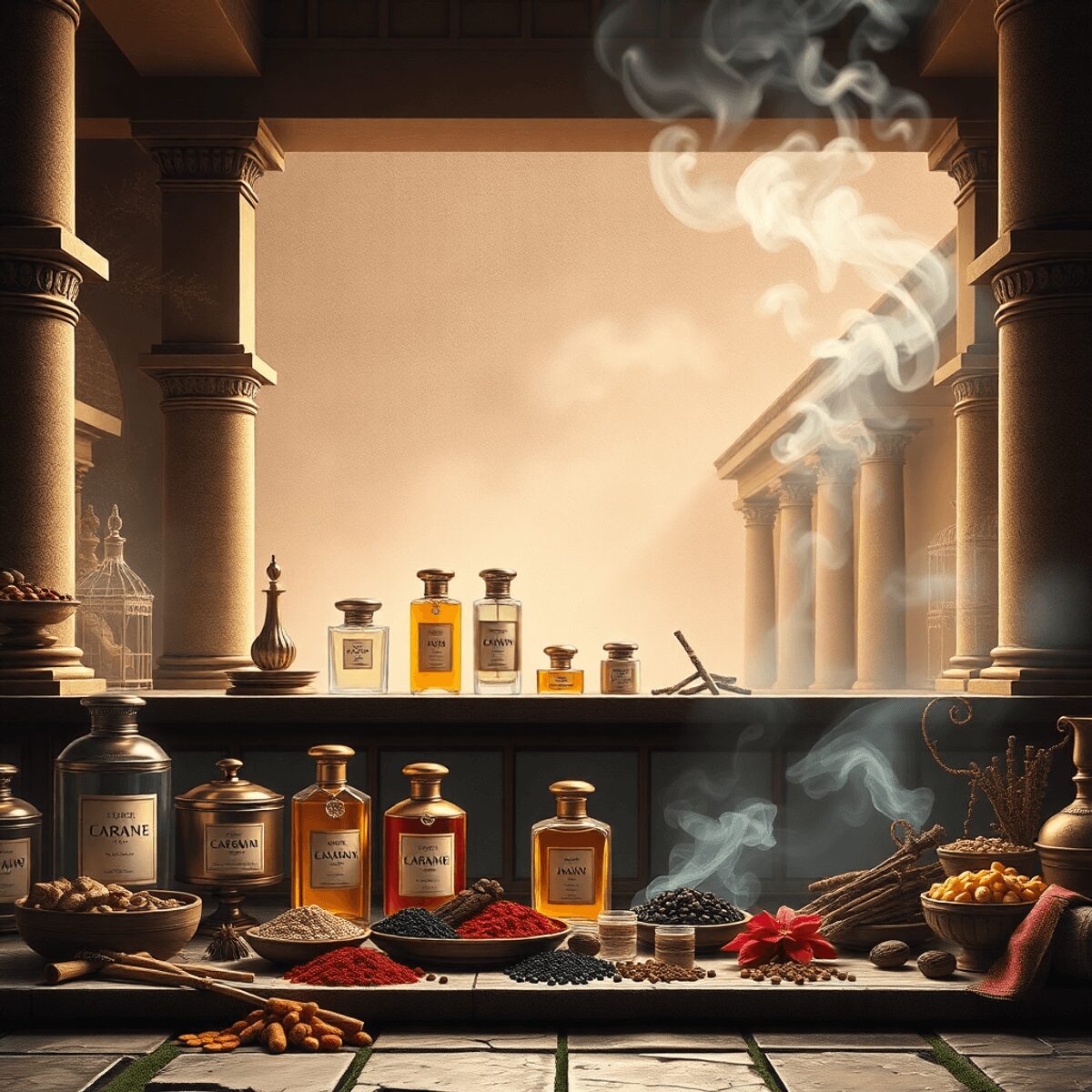
Enchanting Environments: The Ubiquitous Use of Perfumes in Daily Life
Perfumes were an integral part of Roman daily life, used for much more than just personal grooming. They were found in various aspects of their routine, both at home and in public places.
1. Homes
In Roman households, fragrant oils and incense played a crucial role in setting the mood. These scents were often diffused during gatherings or intimate moments to create an atmosphere of comfort and luxury.
2. Temples
Religious rituals in temples included aromatic offerings such as burning resins and perfumed smoke. It was believed that these scents carried prayers to the gods, enhancing the spiritual experience and strengthening the bond between fragrance and divine approval.
3. Public Baths
Public baths were another significant setting where scent held importance. Romans combined bathing with socializing, using perfumed oils and scented powders after cleansing to maintain freshness and attractiveness. The shared fragrances in these communal spaces contributed to a multisensory environment that influenced social interactions and personal presentation.
The widespread presence of scent in these various settings demonstrates how deeply ingrained perfumes were in Roman culture, shaping emotions, social dynamics, and cultural practices as a whole.
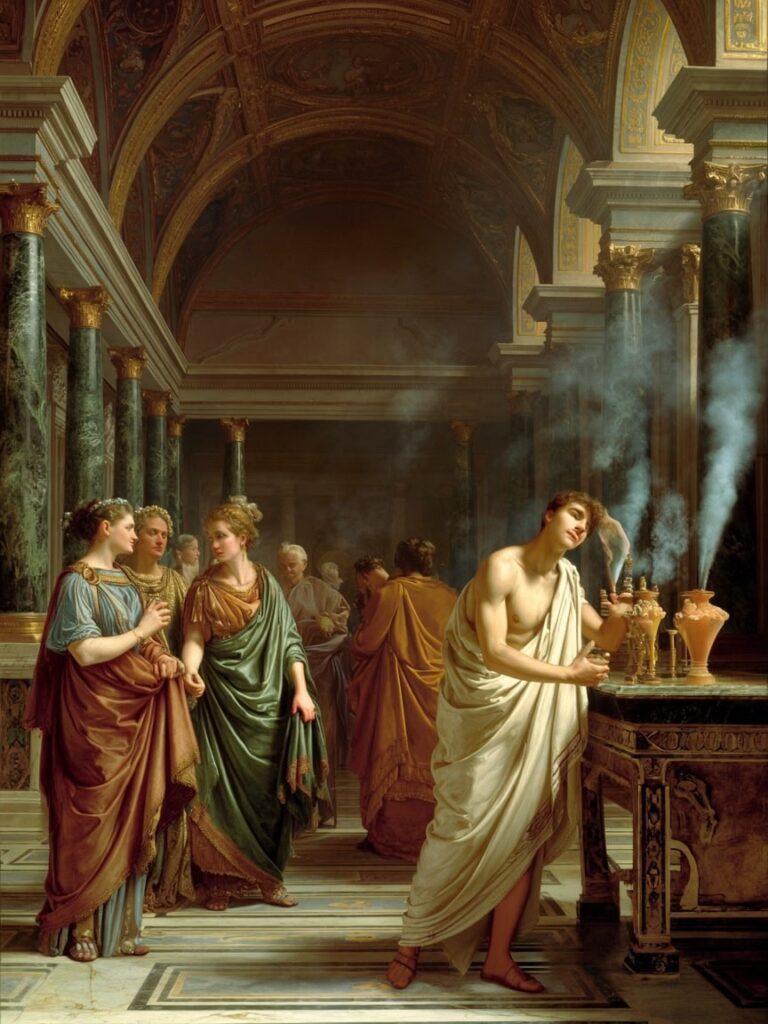
From Rituals to Romance: The Evolution of Perfumery in Rome
The word perfume comes from the Latin phrase per fumum, which means “through smoke.” This origin shows us the strong connection between scent and Roman religious rituals, where aromatic substances were burned as offerings to the gods. These sacred ceremonies relied heavily on fragrant smoke to purify spaces and communicate with the divine, illustrating how scent served a spiritual purpose long before it became a personal luxury.
The Role of Perfumes in Roman Social Life
Perfumes played a significant role in various aspects of Roman social life, including special events and daily rituals. According to a study published in the International Journal of Humanities and Cultural Studies, these scented substances were not merely for personal use but were deeply intertwined with societal norms and practices.
- Banquets and feasts: Perfumed oils and incense enhanced the atmosphere, signifying hospitality and refinement.
- Public ceremonies: Aromatic sprays marked occasions such as triumphal processions or political gatherings, emphasizing status and authority.
- Personal grooming rituals: Application of scented oils after bathing was not only for cleanliness but also an expression of identity and allure.
These practices show us how perfumes were an integral part of Roman culture, representing more than just a pleasant smell. They served as social signals—tools for seduction, markers of prestige, and expressions of cultural sophistication. In this way, the significance of perfume and scent in Roman society evolved from sacred rituals to intimate gestures, connecting public display with private desire.
The Art of Seduction: How Romans Used Fragrance to Entice Others
In ancient Rome, perfume was more than just a pleasant smell; it was a powerful tool used in the art of seduction. The Romans understood the impact of scent on attraction and used it strategically to convey messages and create desired impressions.
The Role of Perfume in Seduction Rituals
Perfume played a significant role in the seduction rituals of ancient Rome. It was not only used to please the senses but also to communicate specific qualities and traits that were deemed attractive. The choice of fragrance became an extension of one’s identity, with different scents representing various characteristics such as elegance, passion, or mystery.
Roman Matrons and Seduction
Roman matrons, women of high social standing, were particularly adept at using perfume as a means of seduction. They understood the power of scent in influencing others and carefully curated their fragrance choices to project sophistication and sensuality. By selecting perfumes that aligned with their desired image, these women wielded fragrance as a tool to enhance their charm and exert influence over those around them.
The use of perfume in seduction rituals reveals an intriguing aspect of Roman society where scent was not merely a luxury but also a form of communication and manipulation. It highlights the significance placed on appearances and the lengths individuals would go to in order to attract and captivate others.
5. Scented Complexity: Exploring the Depths of Roman Perfumery
In ancient Rome, perfumery was not merely about creating pleasant scents; it was a sophisticated art form that encapsulated the essence of beauty, prestige, and emotional depth. Roman perfumers were skilled artisans who crafted intricate fragrances using a wide array of ingredients sourced from across the empire.
1. The Complexity of Roman Perfumery Techniques
The complexity of Roman perfumery techniques extended beyond blending aromatics; it involved alchemical processes to extract essences from flowers, herbs, and spices. These refined techniques allowed for the creation of unique scents that symbolized luxury and sophistication.
2. The Cultural Significance of Scent in Roman Society
Moreover, scent in Roman society transcended mere olfactory pleasure; it held profound cultural significance. Perfumes were intricately tied to beauty standards, reflecting societal ideals of attractiveness and elegance. They also conveyed prestige and social status, with certain fragrances being reserved for elites and aristocrats.
3. Fragrances as Tools for Personal Identity and Expression
Emotionally, fragrances in ancient Rome were intertwined with personal identity and self-expression. The choice of perfume was a deliberate statement that communicated one’s character, aspirations, and desires. In this way, scent became a powerful tool for individuals to convey their innermost emotions and connect with others on a deeper level.
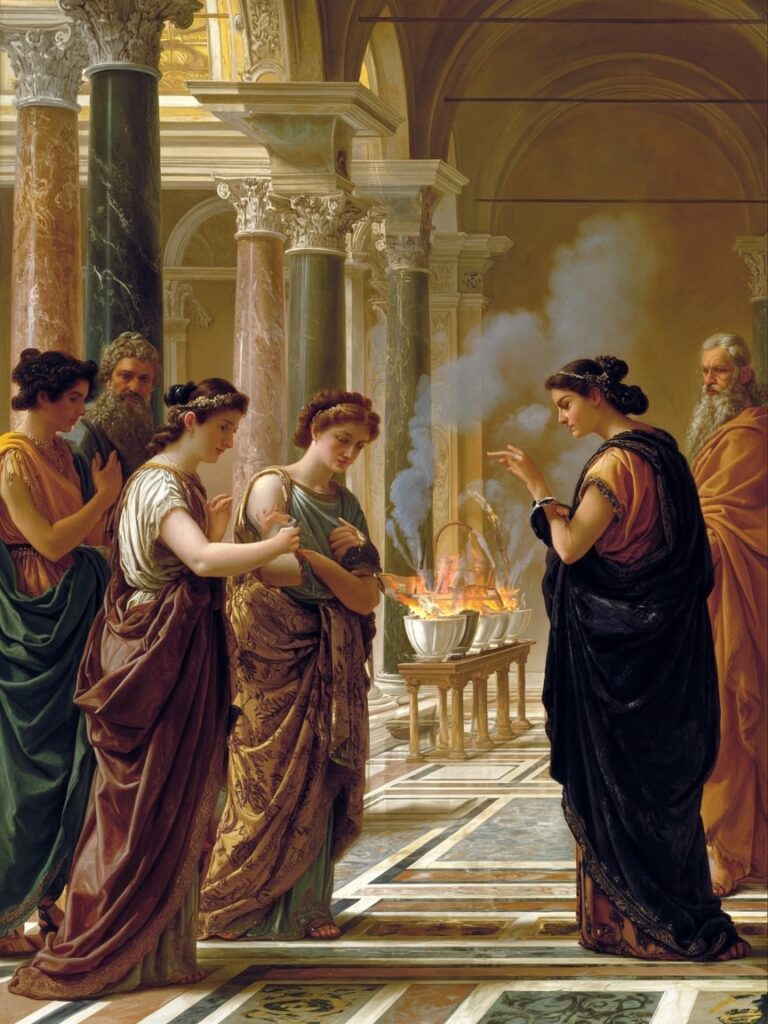
Beyond Aesthetics: The Multifaceted Role of Scent in Social Customs and Interactions
In ancient Roman society, scent played a significant role in various aspects of life, going beyond just being visually pleasing. Perfumes were not only used for personal decoration but also had important functions in social customs and religious practices.
Integration of Scent in Social Customs and Religious Practices
Fragrances were an essential part of religious ceremonies and rituals, symbolizing purification, offerings to gods, or rites of passage. They added depth and meaning to these sacred events, creating an atmosphere that was both sensory and spiritual.
Political Symbolism Conveyed Through Fragrances
Additionally, fragrances held political significance by conveying power, authority, or affiliation with specific factions. The choice of scent could be a subtle yet impactful way to communicate one’s status or allegiance within Roman society. This aspect of fragrance as a tool for expressing power aligns with the ideas presented in Vaclav Havel’s essay on The Power of the Powerless, where he discusses how seemingly insignificant elements can hold substantial power in societal structures.
Role of Fragrance in Intimate Interactions Related to Seduction
In intimate interactions, perfumes were used as tools of seduction, enhancing allure and signaling social roles. The right fragrance could evoke desire and create an intimate connection between individuals.
The various ways in which scent was used in Roman culture demonstrate its deep connection to social dynamics, power structures, and personal relationships. Fragrances acted as silent communicators in a society where subtlety and symbolism were crucial for defining identities and building connections.
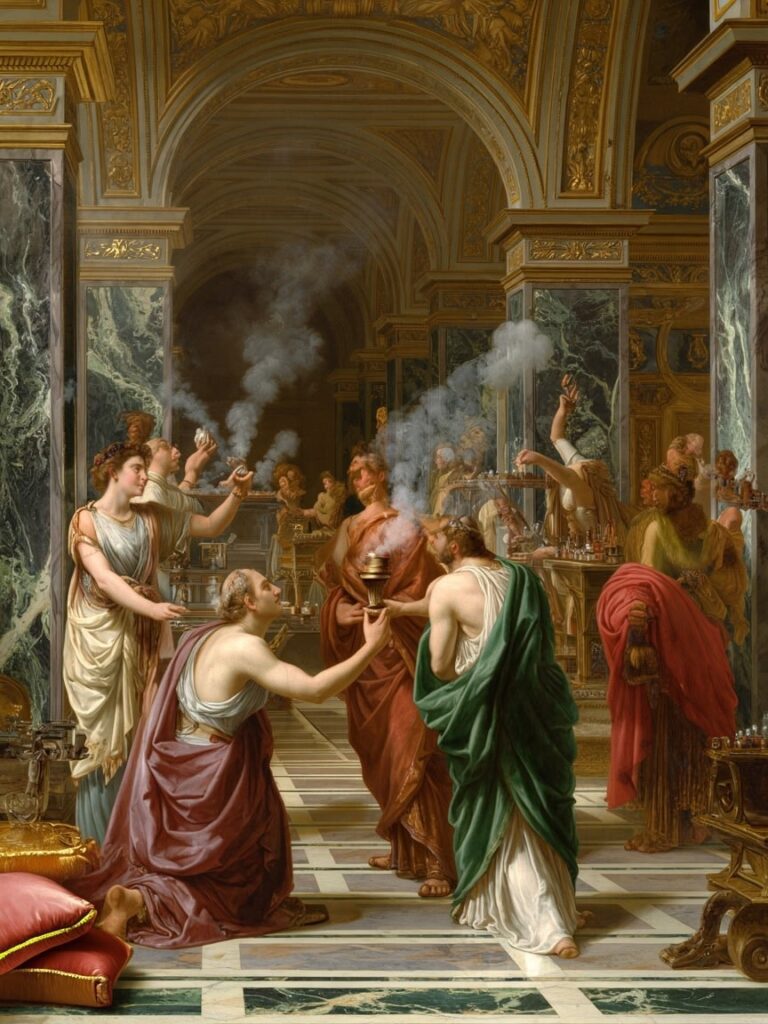
Conclusion
Significance of Scent in Roman Society
Fragrance has played a significant role in Roman society, influencing social interactions and seduction practices for many years. It was more than just a pleasant smell; it was an essential part of everyday life, religious ceremonies, and political symbolism.
The power of fragrance went beyond its visual appeal. It became a means of communication and seduction, reflecting the values of society and the identities of individuals.
By examining the various ways scent was used in ancient Rome, we discover a rich tapestry of cultural expression and social customs intertwined with the world of perfumery. The lasting impact of perfume in Roman society is a testament to its profound influence on human relationships, from displays of power to subtle acts of seduction.
FAQs (Frequently Asked Questions)
What role did perfume play as a status symbol in ancient Roman society?
In ancient Roman society, luxury perfumes made from exotic spices and essences were powerful symbols of social status and wealth. The importation and use of unique fragrances signified power and luxury, reflecting one’s position within the social hierarchy.
How were perfumes used in daily life across different Roman settings?
Perfumes were ubiquitously used in various settings such as homes, temples, and public baths. They contributed to creating enchanting ambient fragrance experiences that shaped everyday life, enhancing personal care and the atmosphere of communal spaces.
What is the origin of the word ‘perfume’ and its connection to Roman rituals?
The word ‘perfume’ derives from the Latin term ‘per fumum,’ meaning ‘through smoke,’ highlighting its origins linked to Roman rituals involving incense and scented smoke. Perfumes played important roles in special events and daily rituals, underscoring their social functions in Roman culture.
In what ways did Romans use fragrance as part of seduction rituals?
Romans, including matrons, strategically used perfumes as tools of seduction to entice others. Fragrance was intertwined with identity and societal roles, making scent an artful component of romantic and intimate interactions within Roman seduction practices.
How complex was Roman perfumery, and what cultural significance did it hold?
Roman perfumery was highly sophisticated, involving intricate techniques to create complex scents. These fragrances were integral to cultural expression, connected deeply with beauty standards, prestige, and emotional significance within society.
Beyond aesthetics, what multifaceted roles did scent play in Roman social customs?
Scent in ancient Rome extended beyond mere aesthetics to encompass religious practices, political symbolism, and intimate social interactions. Fragrances were woven into social customs, conveying political messages and enhancing ceremonial as well as personal exchanges related to seduction.

